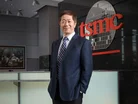The world’s biggest chipmaker bets big on renewable energy

Going green is a struggle for Asia’s chipmakers.
Manufacturing chips is energy intensive and limited access to renewable energy means Asia’s largest semiconductor manufacturers are lagging when it comes to cutting carbon emissions.
This is particularly true in Taiwan, where more than 90% of the world’s manufacturing capacity for the most advanced semiconductors takes place – and there simply isn’t enough green energy to go around.
And the shortage has especially impacted the world’s largest chipmaker – Taiwan Semiconductor Manufacturing Co. (TSMC), which holds 53.4% of the global semiconductor production market and provides 92% of the advanced chips used in modern electronics.
The Global 200 company, which manufactures chips for iPhones, EVs and servers in data centres, has received a backlash in recent months due to falling short when it comes to climate change mitigation.
While the Hsinchu-based company has managed to reduce the intensity of its scope 1 and scope 2 greenhouse gas emissions since 2014, the absolute emission volume of scope 1 GhG has increased over the observed period from two million metric tonnes in 2014 to 2.45 million metric tonnes in 2020, according to Statista.
In 2021, its Scope 1 emissions came in at a reduced 2.15 million metric tonnes, while Scope 2 at 8.15 metric tonnes, according to TSMC’s 2021 Sustainability Report – more emissions than any other chipmaker.
But now, Taiwan’s second-most valuable company – with a market cap of US$494 billion – has set out an aggressive new roadmap to net-zero with new and improved targets.
Rather than reaching net zero carbon emissions by 2050 – in line with RE100, the global renewable energy initiative of which TSMC is a member – TSMC has announced plans to move its target for 100% renewable energy use forward by a decade – setting a new pledge of 2040 for its global operations to go green.
Acknowledging TSMC’s leading role in the global semiconductor industry and influence on numerous economies, TSMC Chairman Mark Liu said the company had “set green manufacturing as the foundation of its sustainability management”.
This means, TSMC is looking to achieve 25% of power at its fabrication sites and 100% at other facilities to be from renewable sources by 2030.
As well as shifting to renewable energy, the manufacturer has outlined plans to reduce greenhouse gas emissions per unit by 40% by 2030, as well as stop growth in carbon emissions and begin reducing them in 2025.
This re-formulation of sustainability targets and confidence in achieving them follows the signing in April by TSMC of a 20,000 GWh renewable energy joint procurement contract with ARK Power.
This pioneering ESG innovation model creates a platform to match renewable energy with industrial power consumption, providing TSMC with a concrete way to reduce its carbon footprint together with companies in its supply chain.
The venture is expected to cut around 500,000 tonnes of carbon emissions per year.
Samsung Electronics also accelerating action on renewables
TSMC is not the only semiconductor giant upping its action on climate change. South Korean chipmaking giant Samsung Electronics, also a member of RE100, re-formulated its environment strategy last year – lifting its investment in green initiatives to more than US$5 billion by 2030.
As the world’s biggest mobile phone maker and among the largest chipmakers, Samsung has one of the biggest footprints of major tech companies with more than 20 million metric tonnes of CO2 equivalent in 2021.
The company, which is almost a third through its goal to be net zero by 2050, is confident in hitting its target however, following its transition to renewable energy use in Vietnam, India nad Brazail in 2022 – in line with its goal to fully transition to renewable energy use at DX and all operational sites outside South Korea by 2027.
******
For more business insights, check out the latest edition of Business Chief Middle East & Africa and be sure to follow us on LinkedIn and Twitter.
You may also be interested in the Business Chief US & Canada website.
Please check out our upcoming event – Procurement & Supply Chain LIVE in London on September 26-27.
BizClik is a global provider of B2B digital media platforms that cover executive communities for CEOs, CFOs and CMOs, as well as leaders in Sustainability, Procurement & Supply Chain, Technology & AI, Cyber, FinTech & InsurTech. We also cover industries including Manufacturing, Mining, Energy, EV, Construction, Healthcare and Food & Drink.
BizClik, based in London, Dubai and New York, offers services such as content creation, advertising and sponsorship solutions, webinars and events.



